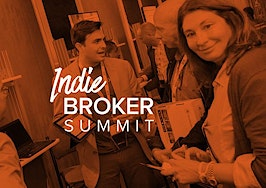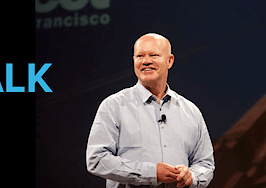- Indie brokerage “woven into the fabric of the neighborhood" shows how hyperlocal efforts fuel business for the long haul.
Sean Becker came to Portland, Oregon’s South Waterfront area in 2004 when it was a “blank slate of raw ground.” Today, it’s where his growing indie brokerage has established deep roots.

Sean Becker
In his first venture 13 years ago, he came with Realty Trust Group, which had an office there for four years.
No one understood the market then, said Becker, with a number of condo developments underway on the former brownfield site. But patience would pay. The locale blossomed into an in-demand neighborhood anchored by the presence of a university and its quarter-mile distance from downtown.
Realty Trust left the area in 2008 when the recession hit, and Becker worked from their office in The Pearl district.
But in 2014, the South Waterfront market had begun to bounce back from the downturn, and Becker recognized an opportunity to start his own brokerage in the area, Sean Z Becker Real Estate (SZBRE).
Becker built his steady firm on high-touch model and strong community ties. A tight inventory 2016 left Becker feeling like “a shoe salesman with no shoes,” but SZBRE made it work with 43 percent share of the South Waterfront market that year, selling 28 of the 65 closed transactions recorded by the MLS and growing sales volume to $60 million from 2014’s $35 million.
His experience shows that one way to truly master a real estate market is to become ensconced in an area when it’s still brand new, its character just forming.
His business, he says, is “woven into the fabric of the neighborhood,” his hyperlocal efforts fueling business for the long haul.
First things first: Join the retailers
Becker didn’t listen when people said the move to independent might “torpedo his career.”
He took an opportunity to buy his own office space, a commercial condo of just over 2,000 square feet, which operates like any other retail location.
He started with five agents, and now there are 11 on the team, mainly agents (called brokers in Oregon), including a market analyst and broker/operations manager, with Becker serving as principal broker.

SBZRE brokerage members
When the market turned again, he was determined not to get caught flat-footed, and the physical operation gave him a real community presence.
Becker estimates his marketing budget is 50 or 60 percent devoted to community involvement. The brokerage is a sponsor of South Waterfront’s farmer’s market, movies in the park and art programs in the area’s four schools.
The SZBRE office is well-known to agents from other brokerages coming to do business in South Waterfront. They regularly pop in to borrow the printer or get the latest MLS listings. An espresso machine is always available for a coffee.

SBZRE office
As an early business in the area, SZBRE become involved with community initiatives from the start. Becker and his team set up a retailer collective group.
“A lot of us in the neighborhood — from dentists to retailers — we were all sharing the same client; there was a lot of commonality, so the idea was let’s all develop a retailer identity in South Waterfront,” said Becker, who has since handed this initiative over to the local community relations association.
“We do continuing education classes for other agencies and brokerages about the neighborhood and condos,” said Becker.
His philosophy is if these agents go and do more business in South Waterfront, so can he and his team.
“We are usually on one side of the transaction,” he said.
‘Condo Curious’ education tours
When SZBRE first started, Becker and his agents found that there was confusion from empty-nesters and first-time buyers about condos, which range from $300,000 for studios to $2 million plus for a penthouse in the area.

SBZRE office
South Waterfront is attracting people who want “urban lite” said Becker. They desire a city feel but also a semblance of peace and quiet.
Since 2014, the brokerage has seen prices go up about 17 percent per year, he said, though these are now leveling off.
“We would meet people who didn’t know which building was which, had never owned a condo, they didn’t know what a HOA was,” he said.
So the brokerage started its Condo Curious tours. In the third week of every month, the tours take groups of buyers through four or five apartments on the market.
They are educational, very low key, with no form-signing involved.
“Every building has its own demographic and look and feel; there are nuances to every single building,” Becker said.
At their very first tour, 25 to 30 people turned up.
The brokerage is still doing these events, which generally attract about 10 people each time.
How indie firms disrupt
Sean Becker grew up working in his father’s small-town wood flooring business. The gig turned out to be important training for his real estate career.
“It’s got to be about the interaction, not the transaction,” Becker said.
Becker puts forth the idea that independent firms in the real estate trenches can be micro disrupters, as no two are the same.
His business is referral-based, reliant on word of mouth, face-to-face interactions and community involvement, and Becker doesn’t spend money on internet leads, a model that’s “harder to get off the ground but more sustainable,” he said.
The company offers a concierge service to consumers, with agents happy to walk dogs, water plants, or bring a junk truck to clients’ home to get a deal done.
“Real estate is a messy business; there’s no algorithm for that,” added the Portland broker.
While he prides himself on being tech savvy, using cloud-based storage systems and electronic signatures, when it comes to the client, it’s all old school methods, he said. He doesn’t believe tech can replicate the relationship between agent and consumer.
“I don’t think consumers like being treated like cattle, and if you don’t see real estate through the lens of the consumer, then you are out of business,” he said.
A brokerage model that encourages entrepreneurial spirit
Becker, who is still selling himself, runs his business more as a team than a traditional brokerage, with no desk fees and no constant agent recruiting.
In his model, agents work on business, which comes in through collective efforts, and he also has a payment arrangement and model for his agents bringing in leads through their own sphere of influence.
Becker said he wanted to reward the spirit of entrepreneurship, which he has himself, and that’s reflected in his commission split tiers.
The broker, who says he has hired more on “chemistry than skillset,” says the team’s collective business has a 50/50 split with all the marketing paid for by the company (60/40, if it is a repeat client/deal).
Agents who provide sphere of influence business get a 70/30 split with a $20,000 cap, and the agent pays for all of the marketing.
On finding the right formula, Becker said: “It’s taken a lot of false starts and painful conversations — to be honest, there was no book on this.”
How to remain ahead of the game
From where he sits, Becker sees 762 condos and zero real estate offices (besides his).
He’s aware, however, that in this business, he’ll soon have company.
“There is no air gap between us and the competition — and people are nipping at our heels,” he said. “I know the toll it has taken on all of us; it’s not been easy. I’ve bought the space; we’re not going anywhere.”
What gives him the confidence to keep moving forward?
“Transactions come and go. It is not why we are doing this every day,” he said. “Building a presence in the community gives us staying power, and it’s translated to business so far.”












